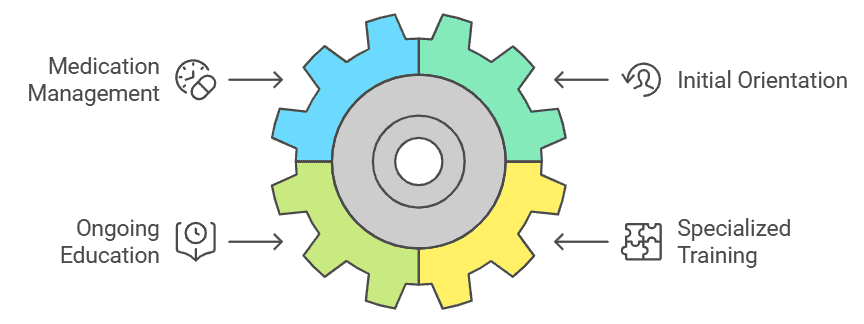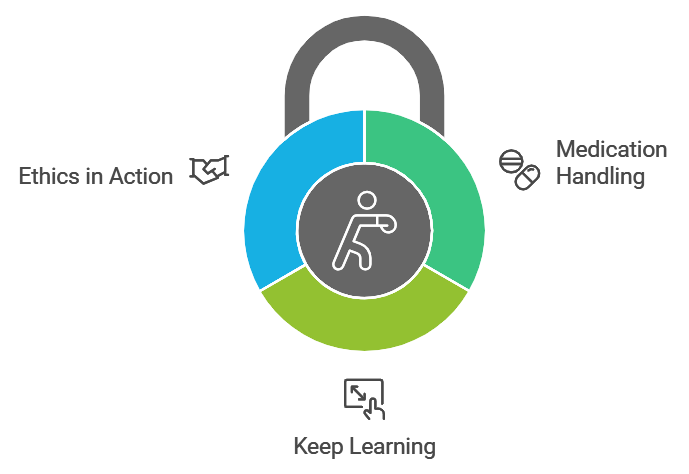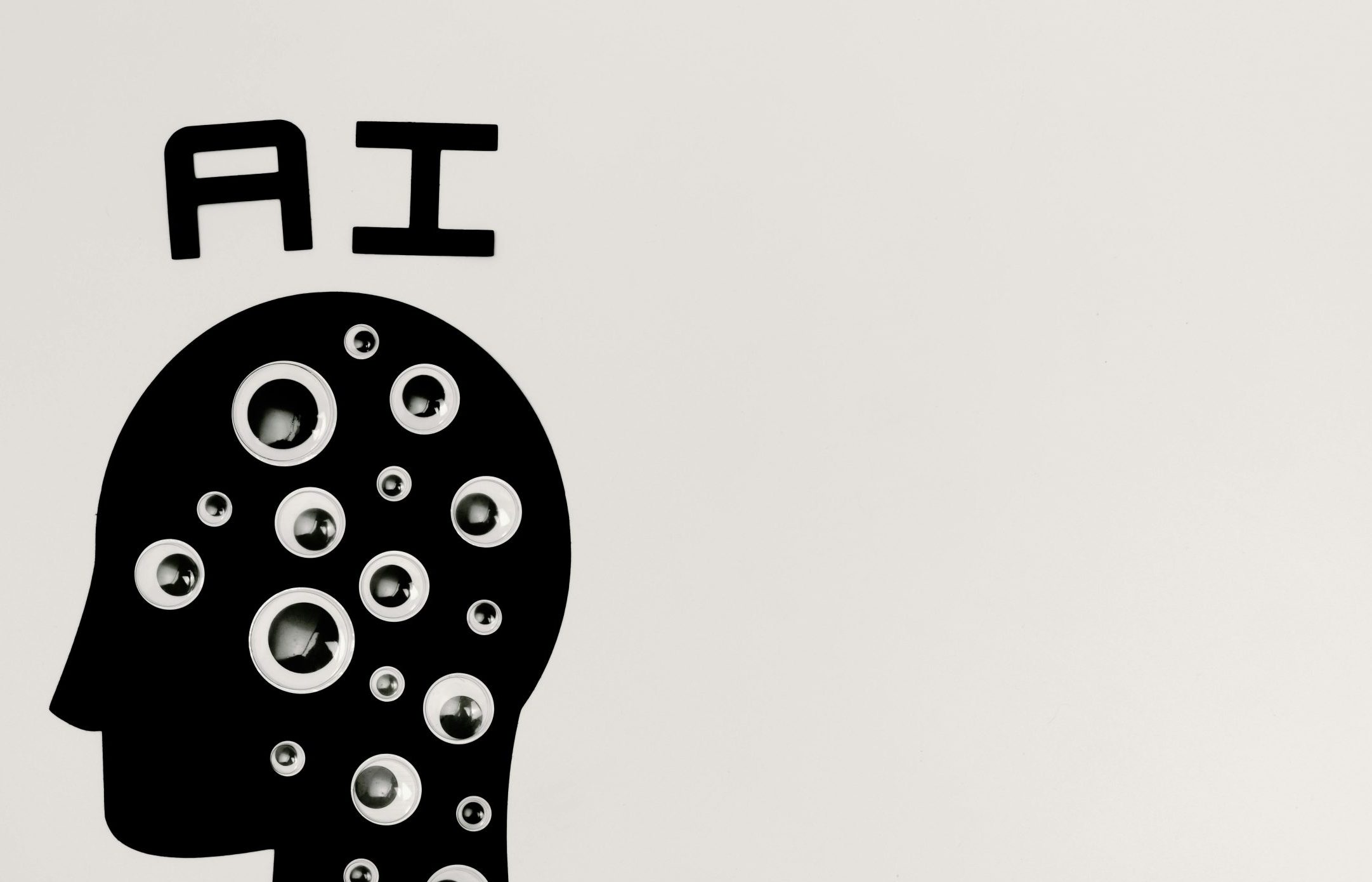Importance of Staff Training
In places like Residential Care Facilities for the Elderly (RCFEs), correctly training the staff to manage medication safely is essential to keep the residents safe and sound. This extra focus on getting training right started after 2016 when increased medication training guidelines came into play for people working in these facilities.

Medication Training Requirements
According to the California Department of Social Services (CDSS), RCFE employees must undergo training programs to care for different resident needs adequately. These programs cover initial orientation, ongoing education, and special training for people with particular conditions, like dementia care.
Specialized Training in RCFEs
A big part of this training focuses on how to manage medication correctly. The right training is vital to giving staff the skills they need to handle medicine properly, especially for residents with complicated medical issues. When staff is working with residents who have dementia, specific training is required to ensure they can meet those specialized needs (Assisted Living Education).
Getting the hang of medication management ensures RCFE staff can provide top-notch care while reducing mistakes that might put residents at risk. Well-prepared staff protect the people they’re caring for and help keep things running smoothly in the facility. Want to know more about reducing medication errors in RCFEs? Check out our article about best practices for training administrative staff in medical practices.
Essential Training Areas

Ensuring that folks working in Residential Care Facilities for the Elderly (RCFEs) are up to snuff regarding medication smarts is crucial. After all, they’re handing out pills to residents with complicated medical needs. Sharpening skills in medication administration, keeping up with the times in healthcare, and sticking to ethical standards are the bread and butter of RCFE staff training.
Medication Handling
Nailing down medication management is a must for RCFE workers to dish out meds with confidence and accuracy. They need to know the ins, outs, and what-ifs: med protocols, how much granny should take, where to stash the stuff, and what to do if something doesn’t sit right. This training means residents get their meds without a hitch, staying safe and sound.
It’s important for the facility’s “how-to” guide on medications to lay things out straightforwardly—what the staff needs to know, specific to their duties and the place itself. Training has to be easy for them to jump into and come with support to keep the learning train rolling.
Keep Learning
Staying sharp through constant education is a ticket to keeping RCFE staff in the loop on the latest and greatest in medication handling. This ongoing learning soups up their skills in ever-changing fields like infection control, emergencies, and first aid. By staying in the know, staff tailor their care to best suit the residents.
The NICE SC1 and NG67 guidelines give a nod to having everyone who helps residents with their meds do a yearly reality check on their know-how, skills, and abilities. Keeping up like this makes them know their meds management game and ensures it’s always up to snuff.
Ethics in Action
Ethical training is the backbone of teaching at RCFEs, guiding workers in keeping interactions with residents and their families above board. It pushes the importance of respecting residents’ choices, keeping secrets, and providing care that fits like a glove with their wishes. This ethical backbone helps staff build a place where respect rules, heavily focusing on residents’ well-being and dignity.
Besides meds, ongoing lessons, and ethical pondering, RCFE staff should also receive lessons that zero in on the particular needs of older folks in the facility. These training areas help RCFE staff provide respectful, top-notch care, boosting the health and happiness of everyone living there.
Ensuring Competence
To keep things safe and up to par in Residential Care Facilities for the Elderly (RCFEs), it’s key that the folks in charge of meds know their stuff. This means checking staff skills inside out, sometimes with an extra set of eyes from outside the facility, to ensure they’re on top of their game.
Staff Assessment Process
According to the Care Quality Commission, having a solid plan for checking out who’s handling medications is a must. Before any rookie gets to touch the pharmacy stash, they’ve got to show they’ve got it all down pat.
Whoever’s doing the evaluating needs to know their stuff and show they can handle all the tasks the job throws their way. This checkup isn’t just asking questions but making sure folks can actually do the work safely and smartly. It’s all about getting the team ready to manage meds without a hitch.
Role of External Assessors
Bringing outsiders to double-check our folks’ skills in handling meds isn’t just a nice-to-have; it’s a good practice backed up by NICE guidance. Pairing up with an accredited learning provider lets the staff show a third party they’ve got the goods.
This outside check, backed by frameworks like the Skills for Care endorsement, means someone else has endorsed your staff’s medication knowledge. It’s like getting a second opinion on a really important test, making sure everything’s up to code, and following the latest safety tips and tricks.
By adhering to a thorough in-house assessment and bringing in an outside perspective, RCFEs can ensure their team is ready to manage residents’ medication needs safely. Staying on top of this helps keep the quality of care high and gives residents the peace of mind that they’re in good hands.
Managing Medication Goofs

When it comes to juggling pills and potions in places that care for older folks, sorting out medication blunders right away is a big deal for keeping them safe and sound. Here, we’ll check out some smart moves for dealing with these mix-ups, from fessing up to errors, using Medication Administration Records (MARs) to patching things up after a blunder strikes.
Reporting Slip-Ups
Singing out loud when goofs happen is the way to keep grandpa and Grandma healthy. When staff aren’t worried about getting in trouble for saying, “Oops,” they’re more likely to report mess-ups quickly. This makes the place better at learning from accidents and keeps the residents safe from bigger messes and those pesky legal headaches (InsureMyRCFE).
Making the Most of Medication Records
Keeping tabs on medication using MARs is like having a map when lost. These records note who gets what medicine, how much, and when. They’re the go-to form for catching errors in the act and backtracking when something goes sideways. The health crew can peek at recent meds with Mars and devise the best plan to fix things (InsureMyRCFE).
Mending Mistakes After the Fact
Quick action is necessary to keep residents in tip-top shape when a medication mix-up happens. Contact the resident’s doctor and ask what remedies will get things back on track. Also, having a staff member regularly check the resident’s vitals is a wise move. If the goof is enormous, giving the resident or their family a heads-up might be needed (InsureMyRCFE).
Mending mistakes isn’t just about fixing today’s oops but making sure tomorrow’s meds go smoother. Taking a hard look at what went amiss, figuring out what went sideways, and strategizing so it doesn’t happen again are all part of the fix. This approach underlines a pledge to keep grandma and grandpa safe and sound while delivering top-notch care.
By following the right reporting tips, using MARs like pros, and jumping into action post-error, teams improve their ability to keep medications on track. Being open, owning up, and always looking for ways to do better keeps residents well-cared for and happy as clams.
Ensure safe medication practices with specialized RCFE staff training. Enhance resident care, comply with regulations, and empower your team to deliver excellence every day. Elevate Your Staff’s Expertise! Partner with Karma Health to implement top-notch training programs. Contact us today to get started!



